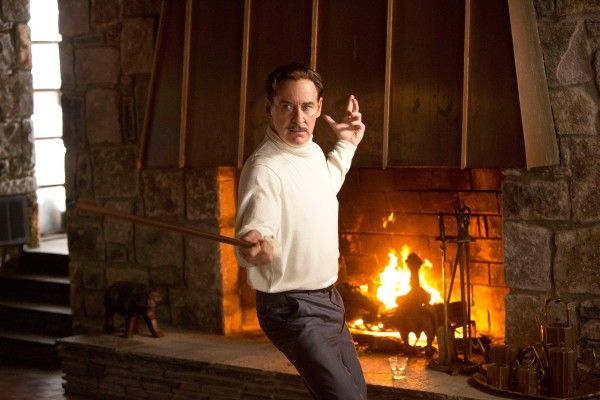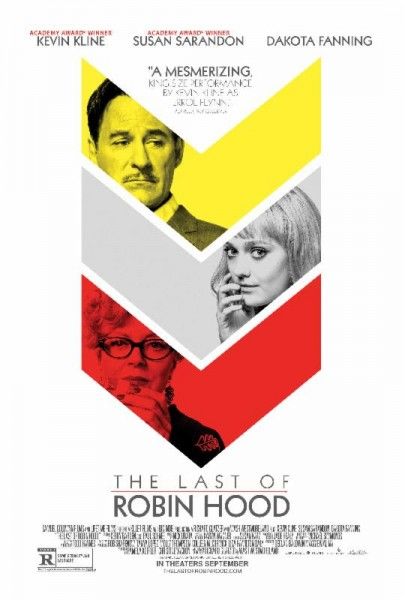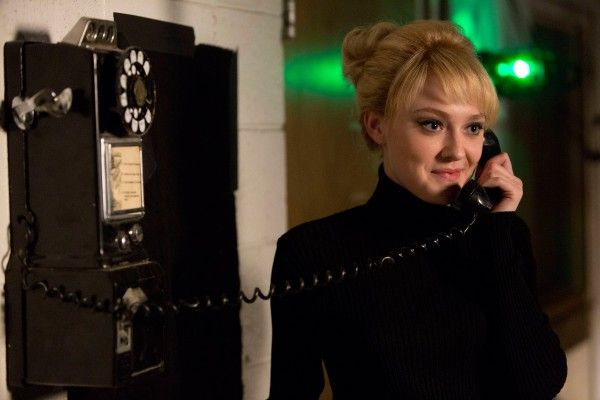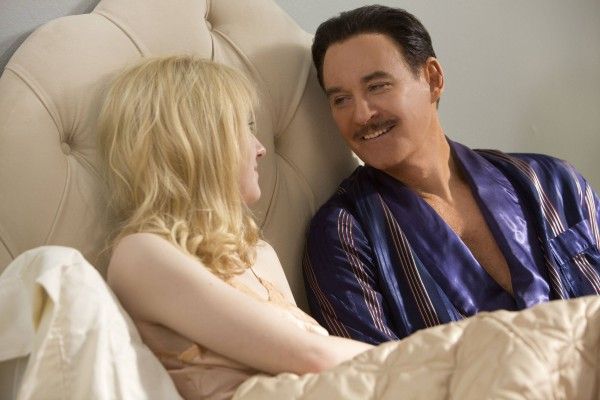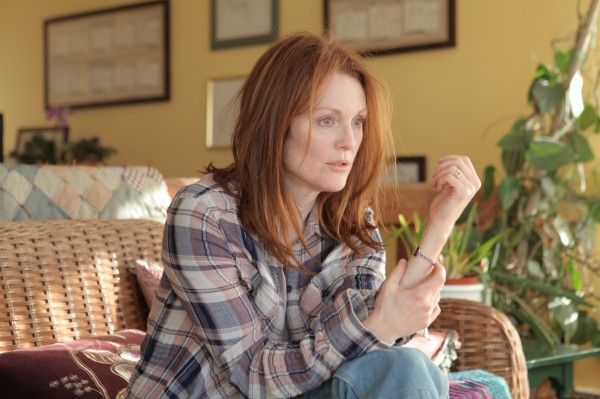From filmmakers Wash Westmoreland and Richard Glatzer, The Last of Robin Hood tells the story of aspiring young actress Beverly Aadland (Dakota Fanning) and her liaison with swashbuckling Hollywood star and notorious ladies man, Errol Flynn (Kevin Kline). Their affair spanned the globe and was enabled by Beverly’s fame-obsessed mother, Florence (Susan Sarandon), until it all came crashing to an end in 1959, when it came to light.
During this exclusive phone interview with Collider, writer/directors Wash Westmoreland and Richard Glatzer talked about what led them to this story, developing it for over 10 years, why they wanted to have Beverly’s involvement and blessing with the production, how special it was to develop a friendship with her, and why it was important to them not to be judgmental in telling this story. They also talked about why their partnership works so well, how excited they are to take their next film, Still Alice, to the Toronto Film Festival, and their experience working with that cast, which includes Julianne Moore, Alec Baldwin and Kristen Stewart. Check out what they had to say after the jump.
Collider: After screening this at last year’s Toronto Film Festival and getting that feedback, and then having to wait almost a year for general audiences would to be able to see it, what’s it like to know that people will finally get to see it?
WASH WESTMORELAND: It’s terrific. It’s really exciting. That first moment you think of a film, you dream of it being on the big screen and out in popular culture. Even though it’s taken awhile, it’s very rewarding to get to that moment. Goldwyn are doing a fantastic job of putting it out, and it’s going to get a decent run. It’s going to be out in the world, and we couldn’t be more excited about it.
How long ago did you first start talking about the possibility of exploring Beverly Aadland’s time with Errol Flynn, and what got you interested in telling this story, specifically?
RICHARD GLATZER: I first heard about Florence Aadland’s book, The Big Love, Jay and Lewis Allen, who were my mentors. I was there in 1991 for the premiere of their Tracey Ullman one-woman show about Florence on Broadway, and I remember thinking, “What a tricky balancing act it is to get the tone right, to keep Florence ,who was a big personality, to becoming too camp.” It wasn’t until 2003 that the thought occurred to me to tackle the Aadland’s story with Wash on film. He read her book and really responded, but we both agreed that we needed the movie to be as much about Flynn and Beverly as it was about Florence.
WESTMORELAND: Really, it’s been well over 10 years since we first met Beverly Aadland, so it’s been a long time getting this film going. We had the scripts and we were like, “When is this ever going to happen? It’s such a great story, and no one is ever going to get to see it.” And then, Beverly Aadland passed away in 2010, and we went to a memorial and were really sad. Richard asked her husband, “Is there going to be an obituary in the L.A. Times?,” and he said, “Oh, I don’t know.” So, Richard actually rang the L.A. Times and said, “You should be aware of this.” So, they printed an obituary that was also printed in the New York Times. We’d been working with a producer on another project, and she’d sent in our script as a writing sample to this manager, who also happened to be Kevin Kline’s manager. And Kevin Kline said to his manager, “Oh, have you heard about this story of the last love affair of Errol Flynn? It sounds really interesting.” I don’t know if he actually got that from the obituary being in the paper that week. She said, “You know what the amazing thing is? I just read a script about that, and it’s really good.” We just thought that Beverly was giving us a hand from the other side. So, Kevin came on through this really unusual connection and responded to the part. We worked with him for over a year, developing the project. And then, it started taking flight and went into production.
So, after all of that, did this movie feel like it was just fated to be made?
WESTMORELAND: Yeah. Robert Aldrich, the director who’s perhaps most famous for What Ever Happened to Baby Jane?, tried to make this movie in the early ‘60s, with Bette Davis as Florence. That tells you how long this story has been in the incubator.
Did you feel like you really had to get Beverly Aadland on board, in some capacity, or could you have gone ahead with this without her involvement?
WESTMORELAND: No, we would not have gone ahead with this project without Beverly’s permission and blessing. The fact is that Beverly gave us so much information and gave us the heart of the story. She had an incredible memory. She could recollect conversations. She wasn’t pushing her own agenda about it. She was very truthful. Florence’s book has this amazing voice, but it needed Beverly’s voice and a lot of information that we learned about Errol Flynn to make it a human story.
It feels like this was a relationship that everyone had a different viewpoint on.
WESTMORELAND: Exactly! Well, it was a completely inappropriate relationship. When we were heading into this, we learned that it was roundly condemned by the tabloids. They were just dragged through the gutter, every week. Our interest in this was not to re-echo that moral condemnation. That’s there in the movie. We show that point of view. But, we wanted to look at how each person saw it. We wanted to look at how Beverly saw this situation. What Florence was getting out of it, and the way Susan [Sarandon] expressed it, was fascinating. And then, what Flynn’s relationship was with this girl, which Kevin Kline got into, very deeply. All three of them came into this strange triangular relationship that had its own dynamic that propelled them across the world through a series of very crazy and unusual adventures.
You didn’t want to pass judgement on this relationship, but were there any moments when you had to catch yourself being judgmental, in any way?
WESTMORELAND: We didn’t ever feel like the story was being too judgmental. We just were always careful where we put the emphasis. We felt it was important that Beverly was the central viewpoint. Even though Flynn and Florence get more verbal fireworks in the story, Beverly had to remain the heart of it. Beverly is the character who goes through this and who has to reckon with this and who changes through this. It’s a coming of age story, in a very unusual circumstance where you have two adults who are both charismatic, interesting raconteurs who have lived life large and who are projecting their own desires on you. So, by keeping Beverly at the center of the story, whatever morality plays around the affair itself, you’re with her and you’re looking at her decisions and her escape route.
When you did meet with Beverly Aadland, what were your impressions of her, and what was it like to spend that time with her?
WESTMORELAND: It was very special, and it evolved over a period of time. She was guarded about talking about the relationship. In the past, her mother’s book had so much attention and had cast the affair in a certain light, and it made a little bit of a joke out of certain aspects fo the relationship. Beverly was a very private person, and it took her awhile to trust us. We probably visited her a dozen times over the period that we were writing, and she gradually got to trust us more and more. We became very close friends.
Did that relationship that you had with her ultimately change the way that you told this story?
WESTMORELAND: Definitely! She had an incredibly memory recall, and certain conversations are verbatim to what she told us the conversations were. The conversation that she has with the chauffeur, Ronnie, after the first night with Flynn, was just exactly how Beverly fed it to us. When we heard it, we got chills because there was a truthfulness to it. It just put you in that car, in 1957, going down that hill from Hollywood, back to her home. It’s a writer’s dream to get such authentic, raw material from the person that you’re talking to. She wasn’t trying to process it into the greatest love story ever told. She was telling the truth.
Knowing each other and even liking each other doesn’t mean that you’ll also make good business partners. Why is your collaboration as writers and directors so successful?
WESTMORELAND: We’re like two odd-shaped jigsaw pieces that somehow just fit together right. I don’t know why. We don’t always agree. We’re not singing “Cumbaya” to each other, every morning. We’re actually quite critical of each other sometimes, in our writing process, which I think you need. You need that honesty to get to something that’s good. We’re just lucky. We’re life partners, as well. We recently got married. We have a daughter who is our assistant. Things have fallen very fortunately. For us to be able to work together and share our lives together is something that we’re very grateful for. In the last three years, Richard has developed ALS and he’s unable to speak, which is why I’m doing all of the talking. At the point of the diagnosis, we had to take a look at our lives. I was like, “What do you want to do?” Since Quinceañera, we’d spent five years just pushing scripts that hadn’t gone anywhere, and he said, “I want to make movies.” I was like, “Yeah, but these movies might not ever happen,” but he was like, “I want to make movies.” Since then, we’ve made two movies in the last three years. We just feel very blessed. We’ve not just been writing together and planning what to do, but we’ve seen it turn into real-life, flesh-and-blood films, and that’s the greatest feeling on earth.
Aren’t you guys going back to the Toronto Film Festival this year, with Still Alice?
WESTMORELAND: Yeah, we’re so excited. All you ever hope for is that the movie is going to connect. You put it out there and you want it to be something that people are going to take into their minds and into their hearts. That’s the greatest thing, when you see an audience responding and when people come up to you afterwards. When you feel that feeling in the room, that’s a great feeling. With any film, you never know what’s going to happen, but we’re very excited to go there and find out.
What made you want to tell that story, and what was it like to work with that cast of actors, which includes Julianne Moore, Alec Baldwin and Kristen Stewart?
WESTMORELAND: We’ve been extremely lucky, with both films, to have amazing actors respond to the material. In both cases, when you writing, sometimes the ideal people come into mind. Who better to play Errol Flynn, in that period in his life, than Kevin Kline. Who better to play the mom than Susan Sarandon. Dakota Fanning was a dream Beverly. We’re pinching ourselves a little bit that we managed to get such amazing connection between the script and these actors. It’s the same with Still Alice. Working with Julianne Moore, Alec Baldwin and Kristen Stewart was a fantastic experience. These people have incredible skills and talents, and they bring them to the story that you’ve written and make it come alive in this wonderful way. That’s why we’re in the business.
GLATZER: We are spoiled now.
WESTMORELAND: Great actors bring in so many gifts. Your job, as director, is to be good at casting. If you cast it right, then it’s just pure pleasure. If you have the right D.P., you’re getting along with your cinematographer and it looks great, then it’s pure pleasure. It’s when you make the wrong decisions initially and you end up with the wrong people that it’s hard.
The Last of Robin Hood is now playing in limited release.

